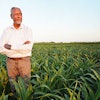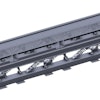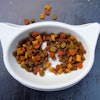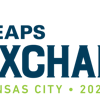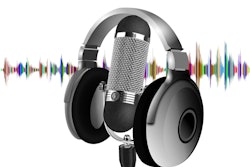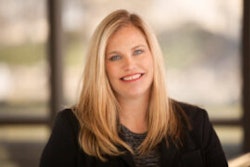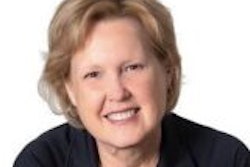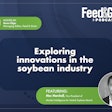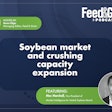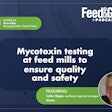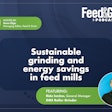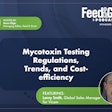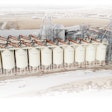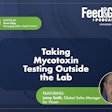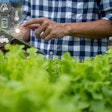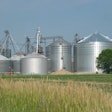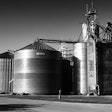Steven Kilger, the managing editor for Feed & Grain and host of theFeed & Grain Podcast, talks with students Ashley Sainey, Alison Bloom and Patrick Badger fromKansas State University's Grain Scienceprogram.
Topics include:
- What drew them to study for a career in the feed manufacturing industry
- How their education is going
- Hands-on experiences they've had making feed
- What their hopes are for their future careers in animal feed
Transcript:
Steven Kilger00:03
Hello everyone. My name is Steven Kilger, managing editor forFeed & Grainand host of theFeed & Grainpodcast. This episode isthe second set of interviewswith some fantastic students from Kansas State University's Grain Science Department.
My guests are Ashley Sainey, Allison Bloom and Patrick Badger, who are all great to talk to and and a lot of insight into the industry itself and their futures within it. We discuss why they took an interest in the feed industry their experience getting an education in grain science and what they look forward to in their future careers.
Kilger00:43
But before we start, I've got to do a bit of housekeeping if you're listening to this podcast within a podcast app, please consider helping us out by subscribing and or leaving a review. If you have an idea for a topic you'd like me to cover or for someone in the animal feed grain handling or related industries, you think I should talk to let me know. This podcast page on feedandgrain.com has a button right under the title that will let you send me an email directly alright enough of that onto the conversation itself. Tell me who you are, just so I have it.
Ashley Sainey01:17
I'm Ashley Sainey. I'm from Norfolk, Nebraska, and I'm currently a junior at Kansas State science.
Kilger01:24
What drew you to feed science? Why were you like, this is the career for me.
Sainey01:29
I grew up in and around livestock my whole life. We do show stock -- mostly sheep and goats. Chickens within the last five years. But mostly sheep, goats, chickens, occasional steer, heifer, the occasional hog, but mostly sheep, goats, chickens.
Kilger01:49
It's the family business for you guys. Well, what part of the country are you from?
Sainey02:07
I'm from Northeastern Nebraska, about four hours north of Manhattan.
Kilger02:15
Well, that's one of the big advantages of being in feed. So you can kind of go anywhere in the Midwest.
Sainey02:23
Midwest, and on the East Coast. There's a lot. There's a lot of opportunities out there.
Kilger02:27
Is that part of what drew you to it?
Sainey02:30
Yeah, how many opportunities I have. And then growing up in livestock, it's just, I didn't want to go in ... while science, animal science is great, it's great. But it does not get me to where I want to be I want to go the next level more specific, more, more geared toward what I want to do. Feed science is the only program in the country that can allow me to do that.
Kilger03:07
Have you gotten to walk around a little bit?
Sainey03:14
Yeah, I've gotten a lot of people. So my dad is actually at the show. He is an employee at UVM. So is a big part of the show and he's been showing me around and introducing me to people, which is a great way to meet people.
Kilger
I didn't ask anyone else's, but I'm going to ask you this. What about companies? What do they have to do to attract you to the work for them?
Sainey
I guess I haven't really thought about that. I think for me, I want to be in Nebraska somewhere. I think that's just something that I want to do. I'm willing to relocate if I if I like the idea. I just I like to be close to home. I'm a big family person. So being in that like eight-hour range of around home would be great for me.
I think East Coast is a little bit far. But anywhere in the Midwest, I can I can make what work but just being an overall good company being somebody that appreciates their employees and knows that there's a there's a time and a limit between work and work at home.
Kilger03:51
Sure. I actually really liked Nebraska. Omaha is one of my favorite Midwestern cities. Anything else you're looking forward to at the show you guys get to do any education sessions, anything like that?
Sainey04:00
We've done a couple of interview sessions with companies. But right now, I think it's just getting to meet all of the all of the businesses that you don't even realize are in here. And see the poultry side of it. The production side of it. Really cool.
Kilger04:15
Another career Avenue right? If you don't want to end up in the mill. The equipment side also needs as many people as you possibly get.
Sainey04:26
Exactly, exactly. I think there's so many opportunities within feed that there's plenty out there for us.
Kilger04:33
Excellent. Thank you, Ashley.
Sainey04:38
Thank you for talking to me. Nice to meet you.
Kilger04:41
First, we should probably start with your name.
Allison Bloom04:50
Alison Bloom.
Kilger04:53
Thank you for talking to me today. You're going for your PhD now?
Bloom04:59
I'm looking at how we're doing production planning based off of the feed orders coming in, and then trying to tie that to feed deliveries going out the door, and how we're routing trucks and trying to improve the throughput through the mill with that space.
Kilger05:18
What's your goal? Do you want to go in academia? Do you want to do the research side of things? Do you want to go into the the nuts-and-bolts of the industry? What are you thinking?
Bloom05:33
I really, like being in industry. I like playing with big data, big data sets and trying to take the information and the things we're tracking. Already, everything in the middle is automated at this point. So there's a lot of data points we can use. And that's not always being utilized. Not at all. So trying to find a way to take that information and actually make it useful, is really fun for me.
Kilger06:05
And a very emerging thing in the feed industry. It's how we're going to make our profits in the future, because everything's getting tighter. Everything's a little little closer, commodities are up. People want to pay less. So that's where the money is.
Bloom06:21
I like the feed mill side and I've background been in swine barns. I've been in labs for a couple of years. Now, in feed mills, I like being able to kind of work between all of the spaces and see how that information connects to each other.
Kilger06:41
What made you decide that feed science was for you.
Bloom06:47
My path has not exactly been linear, I mentioned that I've been in swine barns. So growing up, we had a swine finishing barn that my family would manage. I had that background and then decided I wanted to do more like genetics and microbiology and science and realized that I maybe wanted to do a pathology about school route.
After working for a couple years, I kind of realized that's not what I actually wanted to do. So I was looking at programs to come back to school, And I really liked the swine side again, and I had found that passion. I was talking to a swine nutritionist, and it just so happened, he told me look at K State.
I talked to their program, and it kind of all worked out that my background matched really well with what some of Dr. Paul could have been doing with food safety. I fell into food science without knowing what it was. Then after being in it, and doing my masters, I really saw the need and the ability to kind of expand.
I learned that I really liked data, and I like I like trying to make sense of it. I saw use for that. I had fallen in love with being in the mill and the people who manage and operate and even the few delivery drivers I enjoy working with and talking to and learning what they know and what they've accumulated over the years. Trying to find a way to preserve that knowledge, I think is really important too.
Kilger08:18
Yeah, definitely. Have you gotten to talk to some of the data guys here at the show?
Bloom08:23
Yeah, I've talked to quite a few people. I've talked to some of the trailer guys as well on what systems they have on their on the trailers and how they're able to like track feed and what been exactly they're dropping it into or not. And some of the control systems. It's been it's been very fun. Yeah.
Kilger08:42
Well, I've been in covering the industry for about eight years now. And even in that eight-year span, all of that stuff has advanced so much. You could argue that we were behind for a while. We're doing we're catching up slowly but surely. So it's really cool to hear. You'll be hopefully talking to people like me a lot.
Bloom09:06
I'm happy to talk about what I do. I think it's really fun. I like sharing it with other people and seeing what what their experiences are and their view on the industry. Because academia, we can come up with some really cool ideas and fun things to do. But it's only as useful as the people who would be implementing it. Seeing what the industry needs and what they maybe are already doing that we're not aware of, or what we have thought of that might be helpful and they maybe give us a reality check sometimes. That's a really cool idea. But here's reality in our system and trying to make it actually useful.
Kilger09:43
In the future, what do you what do you think it will attract you to a company say so you can work anywhere in the world, but what are the things that you want for the company that you work for?
Bloom09:53
That's a very good question. I have ideas but they're not fully fleshed out just because I still am very early in my PhD program. I like companies that are able to run the span of having really high level conversations in the boardroom and leadership of here's our metrics are what we're trying to do. Here's how we think we can achieve that, but also have that buy in. That relationship with their operators and their middle managers and their growers or producers, and the people who are probably going to be the ones implementing those changes are doing some of that extra work, maybe that is required, and being able to go to them and explain, this is what we're trying to do.
If we're adding something to their day, or adding something to their tech list, being able to explain why we're doing that and how it benefits them, and benefits the company. Instead of just kind of passing down from leadership of this is what we're doing. I really like having a company where I can kind of run between those levels.
Kilger11:08
Yeah, you want to be involved in a level you don't want to be locked in, in a cubicle somewhere doing ...
Bloom11:13
Exactly. And I've seen, I've seen the challenges that happen when your teams aren't able to communicate with each other, like even at K State, just between our grad student research and trying to get our undergrad help lined up. No matter what the size, there's always communication challenges. But I think when you know, people and know, know them on a personal level, you're more likely to get the benefit of the doubt and have people ask you questions, instead of digging in their heels.
Kilger11:46
Yeah, definitely. I mean, that's a big, I mean, it's not a huge problem. But it happens, right? Because people are in such different levels, I get I have the rare opportunity to get to talk to people that kind of every level of these companies. And it is it's an issue, especially when you're sitting there in the feed mill and you're you are the one to bring the bags into the microphone, my code reader machine and stuff like that. Those little, knowing why you're doing what you're doing.
Bloom12:14
That's something that I'm really grateful for. I've had just with my background, I've been able to kind of see how a lot of steps in the process work. Yeah. So it helps me. I feel like I can bring things to the table and explain like, that's a really cool idea. But here's what the people in that area are actually going to have to do to achieve that. The practical effect. Exactly. Yeah. How the practicality of it. And I don't know everything and I hope I never claim to but it's fun to have that that mixture.
Kilger12:50
Excellent. Thanks, Alison.
Patrick Badger12:56
Hi, I'm Patrick Badger.
I'm from Southern Indiana. I grew up showing pigs and cattle thought I wanted to be a vet.
I went to Purdue for my undergraduate started in pre-vet decided that was probably not the route I wanted to pursue, but I stuck with the animal sciences. When my junior year I started getting into nutrition, took quite a few nutrition classes and undergrad, really enjoyed that. I got into a little bit of undergraduate research help my senior year because that would have been the fall of COVID year.
I got into helping with some research, really enjoyed it and kind of spurred me into emailing actually the swine nutrition team in case they vary. They thought based on what I was wanting to do, because I wanted to have some feed mill experience because I think that'd be important to tie in with a nutrition background. They thought with my experience what I want to do, they thought the deep science program would be really good fit. I emailed Dr. Paul, I think that same day, and we set up a meeting about two days after that. And it just kind of took off from there.
Kilger14:12
Is there any particular part of the industry that appeals to you more than a production background or something like that?
Badger14:18
我喜欢的一些研究方面,像research that we conduct, I like how that is the setup to it. I like being able to be on the forefront of challenges that the industry faces, it's going to continuously change based on diet formulation trends, newest ingredients coming out cheapest ingredients coming out. It's always going to change and it's going to affect your feed mill in various ways. If there's an industry Face Challenge, I'd like to be on the forefront and working with that and trying to get ahead and try to make lives of feed mill managers, feed mill operators. Easier.
Because that's where it's coming from. I mean, you have to have the people with a systems to be able to make that fit. Eat. And if you're having issues, you're not going to make your feet. Yeah. And so I really like that aspect of it. But also enjoy technical services side, if you're going through helping producers and helping feed mills try to optimize their system, run machines more efficiently, and try to help with any kind of issues that they face.
Kilger15:18
Is there any particular type that you're really interested in you like, Oh, I like I'm interested in making the perfect pellet or anything like that.
Badger15:26
Actually, all my research is on pellets, quality, pellet quality effects on pay growth, performances and health, no electrical efficiencies,
Kilger15:38
This is perfect. Right? This is your first show?
Badger15:41
Yes, this is my first view also got kind of trapped in the COVID. Yes, we were planning on coming last year, and I believe it was three or four days before we were going to leave. That's when, as Allison said, the Delta variant spikes, especially here in Atlanta. And with Kansas State University's guidelines and recommendations, we decided we opted, it'd be smarter. To stay back, you got to go around and talk to vendors and things like that, it's been a really good experience.
因为我知道在K与饲料加工厂的工作人员ate, we operate with Interstates software, and control system and I like going through and I like to learn that the different software packages that are out there and automation systems, just to get a general idea because not every detail or company is going to want to operate on one system, I'd like to be able to know a little bit about each one, try to round myself off even more.
Kilger16:35
所以问题你要出去,你要研究生uate one day, and you're gonna get a bunch of job offers. Fingers crossed. Who knows? Maybe. What do you look for in companies that you want to work for? What do you what what are some of the things that you're? And this is, this is for them? They want to know that, when I asked this question, they want to know how they can recruit you. It's not the other way around.
Badger17:09
This is a personal preference. For me, I know some people are different. Some people want to be a number within a company that they would they like that, I like having a little bit more of a personal connection, getting to know people getting to know the company more on a personal level, not just business level. Because ultimately, if you're working with a with a customer, they might purchase a product because they liked the product, but also that, in my opinion, the biggest aspect is the person selling the products, they've got to have a personal connection with the truth. I'm very big on that. I like trying to build those personal relationships going into it. Through an interview process and follow up emails and just stayed in contact even. Especially now I'm going up by didn't get an offer. I didn't get back from an application.
I don't get better, because I've already met those people and that's a connection that'll go with you. They may they may not remember exactly who you are. They might remember the name though. Yeah, this sounds familiar. And that's a connection you can go. And if you see them at an additional meeting, you start building that relationship over time. And regardless of the work form, it's still a relationship that matters. Yeah, somebody that might share an issue at their facility or within their company. And you try to work together to accomplish that, or ways to solve that. Now it's ideas back and forth. Just building those relationships is what I would be is paramount for.
Kilger18:37
You're in the perfect industry for that because so you'll see the same people year after year. And get to know them and watch as they go even if they branch off from you and go a different direction. So you've chosen wisely.
Hi, Steven again. I didn't record your outro on the show floor. So we're doing this now in the future. I just want to thank Ashley, Allison and Patrick for talking to me and of course you for listening. I hope you enjoy the podcast and I hope that you'll be back for the next one. Stay safe.

